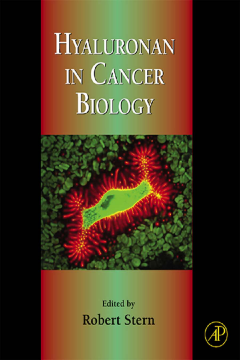
Additional Information
Book Details
Abstract
Hyaluronan biology is being recognized as an important regulator of cancer progression. Paradoxically, both hyaluronan (HA) and hyaluronidases, the enzymes that eliminate HA, have also been correlated with cancer progression. Hyaluronan, a long-chain polymer of the extracellular matrix, opens up tissue spaces through which cancer cells move and metastasize. It also confers motility upon cells through interactions of cell-surface HA with the cytoskeleton. Embryonic cells in the process of movement and proliferation use the same strategy. It is an example of how cancer cells have commandeered normal cellular processes for their own survival and spread. There are also parallels between cancer and wound healing, cancer occasionally being defined as a wound that does not heal.
The growing body of literature regarding this topic has recently progressed from describing the association of hyaluronan and hyaluronidase expression associated with different cancers, to understanding the mechanisms that drive tumor cell activation, proliferation, drug resistance, etc. No one source, however, discusses hyaluronan synthesis and catabolism, as well as the factors that regulate the balance. This book will offer a comprehensive summary and cutting-edge insight into Hyaluronan biology, the role of the HA receptors, the hyaluronidase enzymes that degrade HA, as well as HA synthesis enzymes and their relationship to cancer.
- Offers a comprehensive summary and cutting-edge insight into Hyaluronan biology, the role of the HA receptors, the hyaluronidase enzymes that degrade HA, as well as HA synthesis enzymes and their relationship to cancer
- Chapters are written by the leading international authorities on this subject, from laboratories that focus on the investigation of hyaluronan in cancer initiation, progression, and dissemination
- Focuses on understanding the mechanisms that drive tumor cell activation, proliferation, and drug resistance
"For decades, hyaluronan researchers have followed with growing interest the slowly developing story of how cancer progression and metastasis are correlated with or regulated by hyaluronan and its catabolic degradation products. Initially trying to understand the role of hyaluronan metabolism in prostate, breast, melanoma and other carcinomas was a bit like the story of the blind men touching and describing an elephant, each with a different impression of what they found. Now, however, our understanding of how hyaluronan is related to cancer biology has come into much clearer focus and this is captured nicely in Hyaluronan in Cancer - a collection of well written research perspectives and summaries from ~20 research groups around the world. The timing of this volume edited by Dr. Stern is excellent - readers can now get an overview and understand the importance of hyaluronan in multiple cancers. The book provides the first state-of-the-field summary and should be a highly useful and cited source for cancer biologists and hyaluronan researchers for many years."
--Paul H. Weigel, Ph.D., Professor, Chairman George Lynn Cross Research Professor, Ed Miller Endowed Chair Biochemistry & Molecular Biology, The University of Oklahoma Health Sciences Center, College of Medicine, Oklahoma City, OK, USA
"Hyaluronan is a major component of the fluid extracellular matrix that surrounds cells and fills the intercellular spaces of tissue. Long known for its fundamental role in tissue development and physiology, hyaluronan’s involvement in cancer progression and metastasis has more recently become the subject of intense multidisciplinary efforts.
This volume provides a state-of-the-art review of hyaluronan’s role in the cell biology of cancer, its diagnostic and prognostic value, and its potential as a target for therapeutic intervention. Authored by leading researchers in the field, the chapters help bridge the gap between basic science and clinical oncology, providing background and context that will prove valuable to both cancer and hyaluronan researchers for years to come."
-- Philip A. Band, PhD, NYU Hospital for Joint Diseases, Department of Pharmacology, Department of Orthopaedic Surgery, New York University Medical Center, New York, NY, USA
"The link between the polysaccharide hyaluronan and cancer is well established. This excellent and comprehensive book brings together expert opinion for a thorough and up-to-date review of the topic. It covers the cell biology of hyaluronan in cancer, the role of hyaluronan receptors and signal transduction pathways and the clinical uses of hyaluronan-related biomaterials as anti-cancer agents. This book is a must read for those interested in the role of hyaluronan and its receptors in cancer biology and therapy."
--Anthony J. Day, Faculty of Life Sciences, University of Manchester, UK
